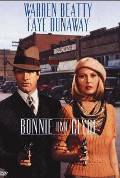
Directed by
Arthur Penn
112 minutes
Rated M
Reviewed by
Bernard Hemingway


Bonnie And Clyde
A classic of the 1960s American New Wave, symptomatic of the anti-establishmentarian spirit of the times and Penn's best film (and arguably the finest moments of both Beatty and Dunaway), Bonnie And Clyde is generally regarded as the pioneering template for an innumerable number of crime road movies that have since followed it.
Although not apparent today, it was in 1967 a confrontational film, one that not only unabashedly sympathized with the outlaws (which had also happened with Fritz Lang's1937 version, You Only Live Once, but appeared to indulge in a hitherto unprecedented level of violence (although today the comedic aspect in the first half of the film, underscored by Scruggs and Flatt's hillbilly music, seems a tad overdone).
Faye Dunaway and Warren Beatty play Bonnie and Clyde (both of whom in real life were younger than either actor). Bonnie lives a life of quiet desperation in a dead-end West Texas town and one day sees Clyde about to steal her mother’s car. She challenges him but decides that stealing her mother's car isn't such a bad idea and before the day is much older their life of crime has begun. Along the way they pick-up a not-very-bright gas station attendant, C.W. Moss (Michael J. Pollard) along with Clyde’s brother, Buck (Gene Hackman), and his wife, Blanche (Estelle Parsons) and The Barrow Gang are in business.
Penn’s telling of their story is bold and direct, at once romanticizing the killers, with Dunaway and Beatty as visually seductive a screen couple as there ever has been, but also showing the tawdriness of their way of life and Clyde’s limited intelligence. The real strength of the film emerges as the noose begins to tighten around the Barrow's neck and Bonnie senses their approaching doom (in a poignant moment the gang visit her mother and extended family, effectively to say their farewell), culminating in a stunningly staged execution, one of the most memorable final scenes ever put on film.
The film won a Best Cinematography Oscar for Burnett Guffey and the screenplay by David Newman and Robert Benton, if playing loose with the historical facts, is economically taut. Both Dunaway and Beatty are excellent, she a Bardot-ish Nouvelle Vague wild child, he an earnest and none-too-bright Belmondo-ish dreamer, whilst Estelle Parsons won an Oscar for Best Support Actress and the film provided Hackman with his boost to the big time.
FYI: The legend of Bonnie and Clyde was also the basis of They Live by Night with Farley Granger and Cathy O'Donnell (1948) and Gun Crazy (1949) with John Dall and Peggy Cummins.
Want something different?





